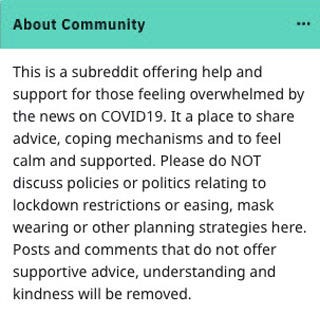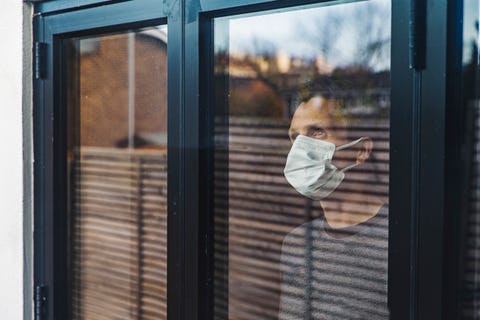A week before lockdown began, a week before we were all told to stay home to save lives, Ryan Seller was diagnosed with agoraphobia. The diagnosis didn’t come as any major surprise; he had suffered with anxiety for a while, and the bubble in which he felt safe was now pretty much limited to his home, his office and a few local amenities. With his diagnosis came an opportunity to finally work on his condition. Then lockdown happened.
“I’d actually come home to my parents’ house,” says Seller, “which is outside of London in Salisbury, and I’ve been here ever since. I haven’t had to do things like shopping because my mum’s been doing that, and I’m working from home.
A recent survey found 60% of Brits were uncomfortable about going back to restaurants
“I’m in my family home, my childhood home, so it’s somewhere I’m really familiar. Last week, I spent quite a lot of time on edge because there was going to be an announcement at the weekend and I wasn’t really sure what it was going to be and whether I was going to have to start going out again. I’ve kind of settled into this comfortable routine. I don’t feel claustrophobic. I don’t feel like I need to get out all the time. I’m in a really comfortable environment.”
Sound familiar? The rest of the UK may not have been diagnosed with agoraphobia coming into lockdown, but Seller is by no means alone in feeling anxious about returning to ‘normal’. A recent YouGov survey revealed 46 per cent of Brits were fearful about sitting in the barber’s chair or shopping for clothes IRL once lockdown was over, while just under 60 per cent said that going back to restaurants and coffee shops would make them “uncomfortable”. Gyms, pubs and bars fared even worse on the survey, with a little over 60 per cent of respondents saying that both pints and pull-up bars were going to be off the agenda for a while.
It’s unlikely these people are afflicted by agoraphobia, the serious anxiety disorder that can cause panic attacks if sufferers find themselves in stress-inducing places or situations, but they may be suffering from something similar, what’s being referred to as ‘coronaphobia’, or a debilitating fear of catching the virus, that for some is turning emerging from lockdown into a very intimidating prospect.
For lots of people, work and social lives have shifted online during the coronavirus, so it’s no surprise our panic has found its way onto the web too. The COVID-19 support Reddit group was created on February 12 2020, over a month before the UK had put any lockdown restrictions in place and before any of us had thought to wear a mask in public, panic buy pasta or disinfect our lives. Since then, more than 24,000 people have joined to share advice, coping mechanisms and offer support concerning all things COVID-19. The group is currently getting around 20,000 page views every day.

A quick scroll through the comments shows that people are worried: they’re worried about returning to work, about meeting up with family and friends and about what the world will look like once lockdown restrictions are relaxed. “My brother was telling me that he has such bad anxiety about socializing that he doesn’t know when he’ll be able to be in public with another person again,” wrote one user. “I know that this is because people tend to overestimate the risk of things that are new, but do you think that people will need to seek therapy so they can be comfortable returning to normal life?”
It’s important to emphasize that any anxiety in relation to what’s going on is entirely natural
Although the group is international, it was conceived in the UK by Dr Jennifer Cole, research fellow at Royal Holloway, University of London. She explains how her research into global health and the importance of communication during pandemics made it apparent that people need a forum to ease their fears and answer their questions. With a qualified therapist, who she found offering free online therapy sessions to the larger coronavirus Reddit group (which has 2.1 million members and Cole is also a moderator of) she setup the COVID-19_support group to comfort people who were having a tough time coping and just wanted someone to discuss their fears with.
Cole says she often finds herself jumping into debates to provide links to reliable articles or academic papers, as well as talking to people about some of their more extreme concerns. She says that part of her job now is to “ease their fears that going out ever again is a death sentence” by helping them understand that they need to “put risks into proportion and act appropriately”.

Justin Paget
Counseling psychologist Dr Rachel Allan isn’t a fan of the term coronaphobia. She says that referring to people using that term implies that they are suffering from a condition that needs fixing or needs treatment, when in reality fear of catching a highly contagious disease is entirely rational.
“I think it’s really important to emphasize that any anxiety or distress or despair that people are struggling with at the moment in relation to what’s going on is an entirely natural and normal response,” says Allan.
“We’re talking about a very dangerous, very contagious illness in COVID-19, so it would be very odd if we didn’t have some heightened anxiety around that. With everything that’s happened with lockdown and the ambiguity and the stress and the loss of earnings that many people have faced, it would be very odd if we didn’t have difficult emotions and internal struggles.”
Still, even when we’re talking about COVID-19, there does come a point where fear of infection and fear of going back to normal life goes from natural to dangerous and what was once helpful becomes unhelpful. It’s at that point, Allan says, that people should consider reaching out for help.
“It’s natural to avoid the thing that makes us feel threatened, but at the same time if that level of anxiety becomes so debilitating or so distressing that a person is not able to function, or that life really becomes incredibly difficult then that would be a point where somebody might think about seeking some support or some help to manage that,” says Allan. “If someone is really struggling with panic attacks to the point where they’re not able to get out, or to the point where the prospect of having to go out of the door brings on a surge of significant distress and panic, then that might represent something that maybe would help from some help and some support.”
From his parents’ house in Salisbury, Seller has already begun his treatment for agoraphobia. On the advice of his therapist, he’s started going for daily walks to try and get used to being outside again and instead of letting his mum do all the shopping, he’s been making the trip to the corner shop to get bits and bobs, although he hasn’t been able to do a weekly shop just yet.
The thought of going back to live in London is daunting and going to a supermarket, which even for Seller was once just a normal, boring chore, is something that he’ll have to prepare for.
Seller’s taking comfort in the fact that even if people suffer from agoraphobia, people can understand what he’s going through now. In the coming months we’re all going to have to get used to going outside again, and we’re all going to have to adapt to the ‘new normal’.
“I’ve been speaking to a lot of people who are having similar fears to me at the moment, not necessarily stemming from agoraphobia, but the thought of going outside and possibly having to return to work,” says Sellers. “I know at the moment, I’m not in it alone. I know that everyone’s feeling what I’m feeling, whether that’s because of agoraphobia or not, so I’ve taken quite a lot of comfort in people dealing with the same issues. I’m able to talk about it because I know a lot of people understand what I’m going through at the moment, whereas before it was quite a lonely and overwhelming thing.”
From: Men’s Health UK
Source: Read Full Article
